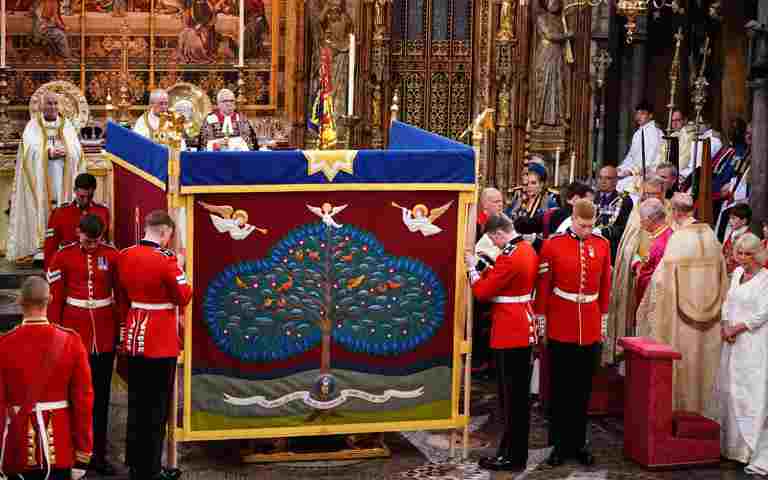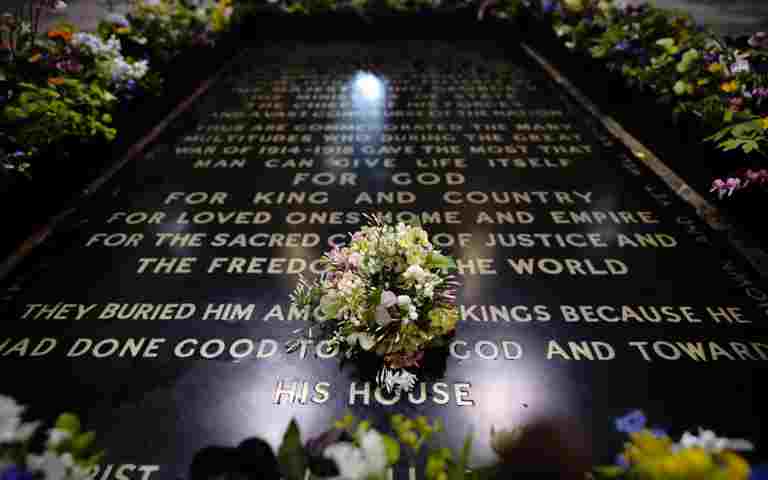Buckingham Palace publishes Order of Service for the Coronation of The King and Queen
Saturday, 6th May 2023

Buckingham Palace has published the Order of Service for the Coronation of Their Majesties The King and Queen, which will be held in Westminster Abbey at 11:00am today, Saturday 6th May.
The service will be conducted by the Most Reverend and Right Honourable Justin Welby, Archbishop of Canterbury, who will be supported by the Dean of Westminster, the Very Reverend Dr David Hoyle.
The service will be sung by the Choirs of Westminster Abbey and His Majesty's Chapel Royal, St James's Palace, together with girl choristers from the Chapel Choir of Methodist College, Belfast, and from Truro Cathedral Choir. They will sing under the direction of Andrew Nethsingha, Westminster Abbey’s Organist and Master of the Choristers, who has overseen all the musical arrangements for the service.
The processions
Following processions of faith and ecumenical leaders and representatives from His Majesty’s Realms, Their Majesties will arrive at the Abbey in the State Carriage and will be greeted by the Dean and the Archbishop.
As the procession of The King and Queen moves through the Abbey, the Choir will sing I was glad, in Sir Charles Hubert Hastings Parry’s celebrated setting of words from Psalm 122 which have been sung at the entrance of the monarch at every coronation since that of Charles I in 1626. The anthem will include the traditional cry of ‘Vivat Rex!’ (Long Live the King!), proclaimed by The King’s Scholars of Westminster School.
Greeting
Before the Archbishop of Canterbury gives a Greeting and Introduction, one of the youngest members of the congregation, 14-year-old Samuel Strachan, a chorister of His Majesty’s Chapel Royal, will address The King, saying: ‘Your Majesty, as children of the kingdom of God we welcome you in the name of the King of kings’. The King will reply: ‘In his name and after his example I come not to service but to serve.’
The Recognition
Following a pattern which has remained largely unchanged through the centuries, the Coronation Rite will begin with the Recognition, when the congregation will acclaim the Sovereign with a cry of 'God Save King Charles'.
The Oaths
The King will take the Coronation Oaths, swearing on the Bible to govern the peoples with justice and mercy, and to uphold the Churches established by law in the United Kingdom.
Then, for the first time at a coronation, The King will pray publicly, for grace to be 'a blessing to all... of every faith and belief' and to serve after the pattern of Christ.
The Anointing
After the sermon, preached by the Archbishop, the ancient hymn Veni Creator Spiritus will be sung to a new setting, in languages from across the United Kingdom, calling on the Holy Spirit just before the most sacred part of the Coronation rite: the anointing with holy oil that marks The King as chosen and set apart by God.
A screen will shield The King from view as he sits in the ancient Coronation Chair, which will be placed on the Cosmati Pavement facing the High Altar. During the anointing, the Choir will sing Handel’s famous anthem, Zadok the Priest, which draws on words from 1 Kings 1 and was composed for the coronation of George II in 1727. It has been used at every coronation since.
Once anointed, The King will be vested in priestly garments that symbolise both humility and splendour.
The Investiture and Crowning
The anointing will be followed by the investing, when items of regalia are presented to The King. These will include spurs and armills of the kind worn by medieval knights, and a sword which The King will first wear and then offer in the service of God. Symbols of secular and spiritual power will follow: an orb, representing the world under Christ; a sceptre representing earthly power, held in a restrained, gloved hand; and the rod with a dove, representing spiritual authority exercised in mercy. There is also a ring symbolising the faithful ‘marriage’ of a monarch to his peoples. Those presenting the regalia will reflect the cultural and religious diversity of the United Kingdom.
The moment of crowning will follow, with the Archbishop blessing St Edward's Crown, and the Dean carrying it to the Coronation Chair. As the Archbishop places the crown on The King's head, the congregation will again cry 'God Save The King' as trumpets sound, the Abbey's bells are rung and gun salutes are fired at the Tower of London.
The Enthroning and Homage
Wearing St Edward's Crown and carrying the sceptres, The King will move to sit in a throne in the centre of the Abbey. He will be encouraged by the Archbishop to ‘Stand firm and hold fast’, confident in God ‘whose throne endures for ever.’
The King will then receive Homage, with oaths of allegiance sworn by the Archbishop of Canterbury on behalf of the Bishops of the Church of England, then from HRH The Prince of Wales on behalf of The Royal Family, and finally - for the first time at a coronation - the Archbishop will invite the peoples of the United Kingdom and the Commonwealth Realms, both in the Abbey and watching on television, to join in a declaration of homage.’
The Coronation of The Queen
The Coronation of The Queen will follow that of The King in a similar but simpler ceremony in which she will be anointed and crowned and presented with her own items of regalia.
Their Majesties will then receive Holy Communion.
The music
The music for the service has been personally selected by The King and will include traditional coronation choices including anthems by Byrd, Weelkes, Gibbons and Boyce, and Walton's setting of the Te Deum, which was written for the coronation of The King’s mother, HM Queen Elizabeth II, in 1953.
The service will also include new commissions:
- Paul Mealor’s ‘Coronation Kyrie’ marks the first Welsh language performance at a Coronation and will be sung by bass-baritone Sir Bryn Terfel and the Abbey Choir.
- A two-part composition has been commissioned from award-winning TV and film composer Debbie Wiseman. ‘Alleluia (O Clap your Hands)’ will be sung by the expanded Abbey Choir before the Gospel, and after it 'Alleluia (O Sing Praises)’ will be performed by The Ascension Choir, the first gospel choir to sing at a Coronation.
- Andrew Lloyd Webber's Coronation Anthem draws on the words of Psalm 98 and its message of 'Make A Joyful Noise unto the Lord, the King'.
- Roxanna Panufnik has written a Coronation Sanctus which she describes as 'starting a little mysteriously with an atmosphere of awe and wonderment as Isaiah describes his vision of heaven. The music quickly builds and finishes ecstatically, with flamboyantly colourful harmonies.'
- Tarik O’Regan has been commissioned to write a new setting of the Agnus Dei which will be sung as Their Majesties receive Holy Communion.
- A series of fanfares marking ceremonial moments in the service has been specially written for the occasion by Christopher Robinson and will be performed by the Fanfare Trumpeters of the Royal Air Force, conducted by Wing Commander Piers Morrell.
At the request of His Majesty, in tribute to his late father HRH The Prince Philip, Duke of Edinburgh, Greek Orthodox music will also feature in the service, performed by the Byzantine Chant Ensemble.
Before the service, Sir John Eliot Gardiner will conduct The Monteverdi Choir & English Baroque Soloists; and the Coronation Orchestra, conducted by Sir Antonio Pappano, will perform new commissions alongside a programme of mainly British music from the last 350 years.
The organ will be played by the Abbey's Sub-Organist, Peter Holder, and before the service by its Assistant Organist, Matthew Jorysz.
The readings
The Prime Minister, the Right Honourable Rishi Sunak MP, will read Colossians 1: 9-20. The Right Reverend and Right Honourable Dame Sarah Mullally, Bishop of London and Dean of His Majesty’s Chapels Royal, will read Luke 4: 16-21, using the sixth-century St Augustine Gospel.
The Coronation Procession
The service will come to a close with the singing of the National Anthem, after which The King will receive a greeting in unison from the Governors General of the Realms, and from leaders and representatives from the Jewish, Hindu, Sikh, Muslim and Buddhist faiths.
The Coronation Procession will leave the Abbey to music including Elgar’s Pomp and Circumstance March no. 4.
How to watch the Coronation
The service will be broadcast on television, on radio and online in the UK, the Realms, the Commonwealth and in countries around the world.
More about coronations
Discover more about the history of coronations at the Abbey and find out about upcoming events:







